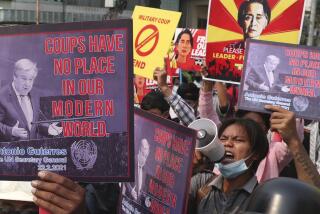Albright Lambastes Myanmar at Regional Summit
- Share via
KUALA LUMPUR, Malaysia — In an unusually tough diplomatic barrage, Secretary of State Madeleine Albright on Sunday accused Myanmar’s government of everything from profiting from drug trafficking to routinely closing schools in a bid to prevent political unrest, acts she said make it “an anomaly” in Asia.
Albright felt compelled to rebut a presentation by Myanmar--making its debut at the annual summit of the Assn. of Southeast Asian Nations, or ASEAN, here--about the state of affairs in the junta-ruled nation formerly known as Burma, according to U.S. officials.
One U.S. official called Myanmar’s presentation “Orwellian,” while State Department spokesman Nicholas Burns labeled it “illusory and self-serving” with “no resemblance” to reality.
“Burma is the only member of ASEAN singled out by the U.N. General Assembly for refusing to honor election results, the only member where the state and society are fundamentally at odds,” Albright said.
“Burma is also the only member of ASEAN where the government protects and profits from the drug trade. In fact, Burma’s top traffickers have become leading investors in its economy and leading lights in its new political order. Drug money is laundered with such impunity in Burma that it taints legitimate investment.”
In Myanmar, she noted, owning a fax machine is illegal, while police regularly arrest legitimate businesspeople in an attempt to stop currency fluctuations.
Albright appealed to ASEAN to take the lead in promoting democratic reforms and a dialogue between the junta and opposition leaders. The junta blocked democratically elected leaders from taking office in 1990.
“We must insist that we work together to promote conditions within Burma that will lead toward true democracy and permit its genuine integration into this region,” she said in an official U.S. statement introduced earlier at the summit. “Now more than ever, Burma’s problems need an ASEAN solution.”
Myanmar was formally admitted this year to ASEAN, an increasingly powerful economic and political bloc, over strong U.S. objections. The other eight members are Malaysia, Indonesia, the Philippines, Thailand, Vietnam, Singapore, Brunei and another new member, Laos.
Unless a “dialogue of reconciliation” opens the way for installation of an accountable government, Myanmar will remain outside the Southeast Asian mainstream and isolated from the global economy, Albright warned. “This is not an admonition but an objective fact we must acknowledge.”
She added that any dialogue must lead to political change and that both aspects must include Nobel Peace Prize laureate Aung San Suu Kyi, whose party won the 1990 democratic elections and whom the junta has been trying to separate from the broader opposition movement.
The alternative to reconciliation, Albright warned, is a chasm within ASEAN between one part that has open, growing and integrated economies and another that is isolated, closed off and poor.
“We want to see the silk curtain lifted: the line that still divides the prosperous and vibrant nations of Southeast Asia from those nations that have been left behind,” her statement said.
Albright’s tongue-lashing reflects the gap between the U.S. and its ASEAN allies on this issue. Washington is trying to isolate and punish the Myanmar junta, most recently with a ban on new U.S. investments, while ASEAN prefers to use diplomatic and economic leverage to influence the regime’s behavior.
More to Read
Sign up for Essential California
The most important California stories and recommendations in your inbox every morning.
You may occasionally receive promotional content from the Los Angeles Times.












